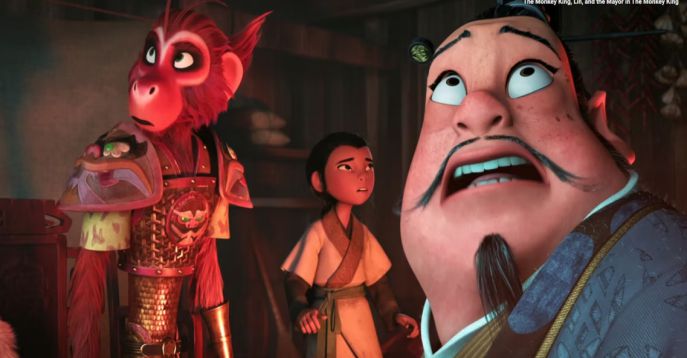The heart of the problem is The Monkey King makes its central character, whose story has been told and retold for hundreds of years, uninteresting.
Editor’s note: This piece was written during the 2023 WGA and SAG-AFTRA strikes. Without the labor of the writers and actors currently on strike, the movie being covered here wouldn’t exist.
In this particularly exciting time for animation, when movies like the Spider-Verse series, Puss in Boots: The Last Wish, and TMNT: Mutant Mayhem seem to herald a new wave of Hollywood studio creativity, it is much more noticeable when an animated film is sub-par. Critics have a history of sitting through underwhelming family fare and shrugging, noting that kids will probably be entertained by the whooshing colors. I am not inclined to grade on that curve, and Netflix’s The Monkey King, a new movie based on the enduring character from Chinese literature, doesn’t clear the bar. Visual creativity and humor are present in flashes, but whatever there is to recommend it is weighed down by a poor script that never finds the story’s dramatic center. Once it loses its way, about 15 minutes into the runtime, it never really hooks us again.
Directed by Anthony Stacchi and set in China during a time in which people shared the world with mythological beings, The Monkey King begins as the titular character (Jimmy O. Yang) is mysteriously born from a rock on top of a mountain. In a universe that thrives on cosmic order, overseen by the Immortals in Heaven, the little monkey is right away a sign of trouble, and the Jade Emperor (Hoon Lee) wishes to do away with him. But Buddha (BD Wong), who stands above all things, intervenes – the creature is powerful, he says, and has a great destiny ahead of him. After facing rejection from a troop of monkeys instills in him a need to prove himself, that destiny sets him on the path to becoming one of the most fearsome warriors on Earth, in hopes of winning a place among the Immortal Ones.
Just trying to synopsize this film illustrates its issues. The Monkey King‘s scope is initially simple, to its benefit. The young monkey, not yet able to speak, wants only to feel loved and accepted by the other monkeys living in the forest beneath his mountain. They reject him and his rebellious ways, which attracted unwanted attention from the Demon of Havoc (Andrew Kishino) and got a fellow young monkey killed. He trains alone to defeat this threat and earn his place among them; after stealing a sentient, all-powerful weapon named Stick (Nan Li), he succeeds, saving another child in the process. But while the other monkeys crown him the Monkey King, the troop’s Elder (James Sie), who had tried to teach him about his smallness in the grand scheme of things, still sees selfishness driving his actions. The Elder’s attempts to cut the protagonist down to size only plant the seeds of ambition to seek greater company, and ascend to the highest ranks of Heaven.
This all occurs in the first 15 minutes, and in that time, the Monkey King’s core motivation is clear. The rest of the film only pays lip-service to that emotional thread. The Monkey King is a mighty, arrogant creature, whose primary modes of engagement seem to be mockery and battle. These traits are meant to be understood by us as armor against further rejection, but he shows no real desire to form a genuine connection with anyone – nor does the storytelling care to give him the opportunity. His quests progress, leading him to grander designs and greater foes, but his feelings remain largely untested, and therefore static. Lin (Jolie Haong-Rappaport), a young girl who fights to become his assistant, at some point accuses him of not letting anyone love him. I struggled to recall a time in the movie when someone actually tried.
Plot-wise, The Monkey King covers a lot of ground; the title character and Lin seem to pursue a new goal every few minutes. But without connecting what he does back to who he is, how are we supposed to care? This lack of dramatic focus is evident everywhere. Lin’s feelings of loyalty to the Monkey King feel forced, compromising what should be compelling about her arc. The film’s stance on whether his rebelliousness should be admired or punished is muddled. The movie’s main villain, supposedly, is the Dragon King (Bowen Yang), who possessed Stick before the Monkey King stole it. He is desperate to steal it back and enact his master plan to flood the surface world and turn it all into his undersea kingdom – a conflict that has no connection to the Monkey King’s goals. That storyline is more of an excuse for a blow-out fight than any culmination of the protagonist’s journey.
It doesn’t help that the execution isn’t great in other areas (the jokes are more misses than hits), but there are pluses here, especially the playful choreography and composition of its action sequences. The heart of the problem is The Monkey King makes its central character, whose story has been told and retold for hundreds of years, uninteresting. Without that spine to hold it together, everything collapses. Netflix has a strong history of animated output: just last year the streamer released Apollo 10 1/2, The Sea Beast, Wendell & Wild, My Father’s Dragon, and Guillermo del Toro’s Pinocchio. All of them are good — some are even great. If you find yourself with time this weekend, I’d recommend catching up with one of those instead.
